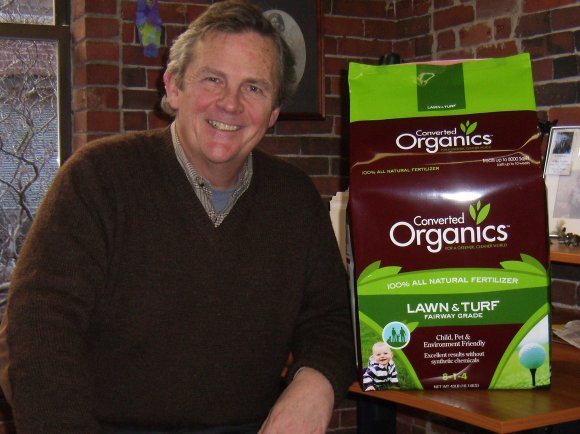
Listen to this Green Air Minute:
Converted Organics (cont.):
Full Interview with Ed Gildea, CEO
by The Green A-Team
With a third of our country’s waste problem completely avoidable, it’s interesting to follow the progress of a developing market that hinges on it’s removal and recycling.
Ed Gildea, CEO of Converted Organics, shared a few moments with us to discuss the process and ethos of turning food waste into organic fertilizers. Ed’s background in law and finance coupled with the sustainable business policies formulated by his brother, Bill Gildea, set him up as one of the leading visionaries in the restructuring of American waste stream management.
Q: What are the origins of converted organics and what drew you to take the helm?
A: Converted Organics was born out of the proposition that a company can be both a profitable organization and a beneficial environmental citizen primarily through the thinking of my brother Bill Gildea. For a long time I was the lawyer for CO and I got more and more involved and kind of naturally fell into the position of being the CEO.
Q: How are you using the food waste stream to benefit the communities where your plants are located?
A: Well, the program that is in Gonzales, CA is that we take the food waste that comes from the schools and other public institutions and we bring it to our facility where we process it through a process called microbial digestion and convert it into a fertilizer which we then bring back to the community and put in the parks and fields of the school department.
Q: And that’s going on in Gonzales right now?
A: Right now in Gonzales California and it’s such a great idea because it validates the business model for our company but at the same time it shows that communities are sensitive to the issue of what to do with food waste and they’re sensitive to the issue to what they’re using in the parks and recreation departments and it becomes sort of an ideal model for us to bring around the country.
Q: How does one bring the food waste from a school to the processing plant?
A: Currently somebody takes that waste and hauls it away to a landfill. All we do is substitute our facility for the landfill. We build what we call “perpetual urban landfill” - build them near cities, truck drivers have a shorter trip than the trip to the landfill, they can bring the waste right to our facility, and spend less money disposing of the waste than they would driving it all the way to a landfill.
Q: What can consumers use the solid product for and the liquid product for?
A: Well they can use either product but just in terms of ease of application, the dry fertilizer product is made to be used in existing systems that homeowners use to spread fertilizer so that the broadcast spreaders and things that people use are readily adapted to use the dry fertilizer product. The liquid fertilizer could also be used but typically homeowner don’t have the wherewithal for using a liquid product in their yard.
Q: Can you walk us through the food waste processing flow at your facility?
A: Sure! The first step is that the truck tips or dumps the waste onto tipped floor. Somebody has the job of going through that waste and pulling out inorganic materials. It’s then conveyed to a large device called a macerator or a hydro-pulper and in this device, the food waste is pulverized and agitated and we add liquids to it and it causes light inorganics, heavy inorganics drop to the bottom. We skim those off, have a pure oganic stream that we then send to the digestors.
Q: Where are your existing bio stimulant manufacturing facilities and what are your plans for the future?
A: Well, at the moment we have one in Gonzales, CA and one in Woodbridge, NJ. We are building the one in Woodbridge, NJ and we bought the one in Gonzales, CA. We’re also considering a couple of additional sites in Massachusetts, we’re on the doorstep of opening or starting a construction project in Rhode Island, we’ve been visiting with people in the eastern shore of Maryland and Deleware, we’ve been busy working with the city and state of New York, we’ also have some opportunities out on the west coast in Modesto, CA and further north in Portland, Oregon and Seattle, WA. Many, many places.


